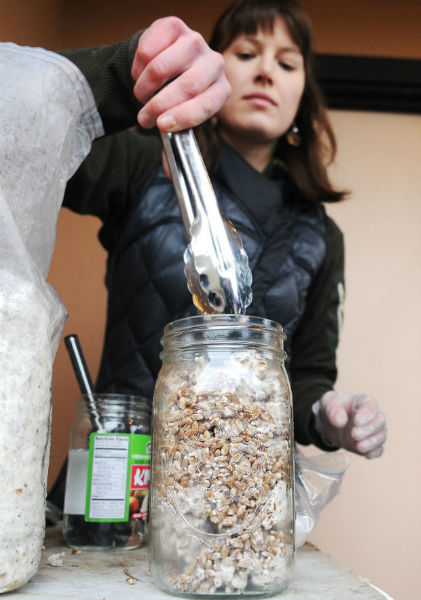A local group is attempting to clean the waters in Corvallis’ Sequoia Creek using an unusual tool: mushrooms.
The process used by volunteers with the Ocean Blue Project, an ecological restoration nonprofit, is to place mushroom spawn and a mixture of coffee grounds and straw in burlap bags that mushrooms can grow in, and then place the bags so that water entering storm drains will filter through them. The technique is attempting to take advantage of the natural ability of mycelium — the underground part of fungi — to break down toxins like oil and pesticides and metabolize harmful bacteria like E. coli.
Ocean Blue Project volunteers placed their first test bag, containing yellow oyster mushroom spawn, in a drainage chute near the Ninth Street Coffee Culture on Sunday.
The Washington Environmental Council has been using similar techniques in parts of the Puget Sound region, and a unrelated study from the state has shown fungi helped remove fecal coliform bacteria from flowing water.
According to Arterbury, the technique could potentially be a low-cost way to use biologic processes to reduce pollution in waterways. Coffee Culture donated burlap bags that carried coffee beans along with the used coffee grounds — all of which otherwise would have been thrown away. Arterbury said other food waste — possibly grain waste from local breweries — could be used to grow mushrooms.
Arterbury said the project has received positive support from the city of Corvallis. He said the biggest concern he’s heard is that people may eat mushrooms that have absorbed dangerous chemicals and heavy metals. Arterbury said since the mushrooms are grown in sacks they are not visible, but he will also hang signs warning people not to eat the mushrooms from the bags.
Rosalie Bienek, a biology instructor at Linn-Benton Community College and a board member at the Ocean Blue Project, brought the idea of using fungi as filters to Arterbury. She said she learned of the technique a year ago from a book called “Mycelium Running,” by Paul Stamets, who has also done a TED Talk on the subject.
“It’s got a lot of potential, and few people in the area are studying it,” said Bienek, whose research concentration is on botany and using native plants in restoration.
Bienek and Arterbury plan to place more of the bags along the creek, and if the water testing shows positive results they want to expand the use of mycofiltration to other areas along the Willamette River.
“If this has a great result we’re taking it everywhere,” said Arterbury.
Source: Corvallis gazette-times

